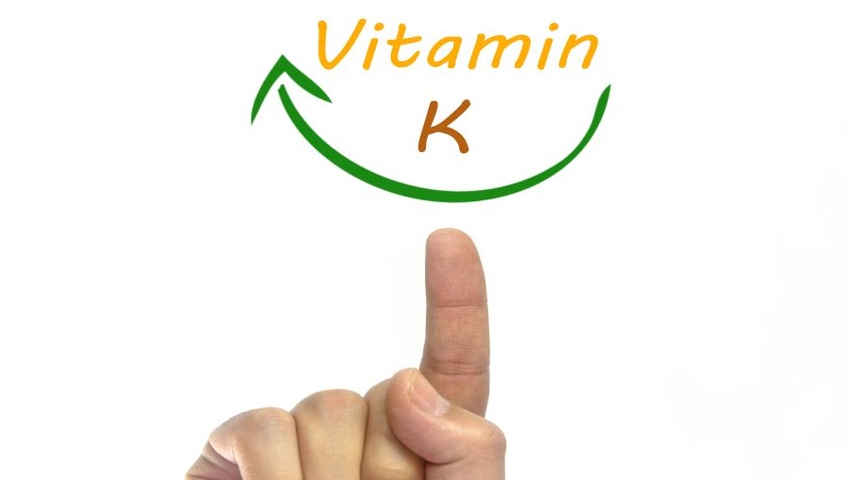In addition to its positive effects on cardiovascular and bone health, vitamin K is also believed to function as an insulin-sensitizing agent, promoting improved glucose tolerance.

Vitamin K has been associated with a variety of health benefits, but before delving into them, it’s worth explaining vitamin K is a name given to a group of similarly-structured, fat-soluble compounds broadly classified as either vitamin K1 (phylloquinones) or vitamin K2 (menaquinones).
Vitamin K1 is found in dark green leafy vegetables such as spinach and kale, as well as some fruits and fruit juices. Vitamin K2 is more elusive, found in human gut bacteria and in some meats and fermented foods such as natto, a Japanese soy dish.1 Vitamin K3 (menadione) is a third, water-soluble synthetic form that while approved by both the European Food Safety Authority (EFSA Panel, 2014) and FDA (Code of Regulations Title 21) for use in animal feed, is not used in dietary supplements or fortified foods due to its propensity to damage liver cells.2
“Vitamin K plays a diverse role in a varied set of physiological functions, where it acts as an enzymatic cofactor to many vitamin K dependent proteins,"3 explained Joseph Antony, Ph.D., research scientist at KGK Science. Two of vitamin K’s most important functions involve the part it plays in the synthesis of proteins involved in hemostasis (blood clotting) and bone metabolism.4 Recent research has also indicated it could play an important role in reducing abnormal vascular calcification.5
“Vitamin K2 specifically has been shown to help in the prevention of the hardening of the arteries, a common factor in coronary heart disease (CHD) and heart failure,"6 Antony said. “Keeping in mind that 13 percent of aging but otherwise healthy individuals have been reported to display coronary artery calcium,7 vitamin K2 can be looked to as a preventative measure due to the role it plays in reducing the progression of coronary calcification, as evidenced by a cross-sectional study conducted on postmenopausal women."8
Sandy Chien, Ph.D., vice president of innovative products for HORN Nutraceuticals, whose Nutri-K JN™ vitamin K2 is made in Japan via fermentation, maintained that vitamin K, especially K2, is one of the most important vitamins as pertains to calcium metabolization.9 “Because of its unique mechanisms of action, it takes calcium away from the artery and deposits into the bones where it belongs," she said. “As a result, vitamin K plays a critical role in cardiovascular and bone health. It is especially important for those who take a calcium supplement to take vitamin K to ensure the proper balance between calcium, vitamin D and magnesium to decrease the risk of heart attack and stroke."
Antony pointed out that while few current guidelines recommend vitamin K therapy for the prevention or treatment of osteoporosis, an extensive amount of data suggests significant potential for supplementary vitamin K to play a role in the improvement of bone strength. “In a two-year randomized, double-blind, placebo-controlled study, postmenopausal women who supplemented with vitamin K1 experienced a 50 percent reduction in fractures when compared to the placebo group,"10 he said. “Vitamin K2 has also proved effective, as a recent meta-analysis looked at the results from 13 randomized controlled trials lasting longer than six months and found reasonable cause to believe that supplementary vitamin K2 significantly reduced hip, vertebral and all non-vertebral fractures."11
An additional, unpublished study presented at the 2017 International Conference on Children’s Bone Health in Würzburg, Germany, found children, aged 5 to 15 years old, who had bone fractures had statistically significant lower vitamin K levels compared to healthy children, aged 7 to 17 years old, without fractures. The study results revealed no statistically significant differences in the calcium levels, bone alkaline phosphatase or vitamin D levels between the groups.
A form of K2 found to be highly biologically beneficial is menaquinone-7, noted Eric Anderson, senior vice president global sales and marketing, NattoPharma USA Inc.
“K vitamins contribute to normal blood clotting, but because of vitamin K2’s molecular structure, it is able to bypass the liver, so it is available to other systems, such as the bones and the vasculature," Anderson said, and added that in doing so, vitamin K2 activates proteins already present in the body, helping the body to properly utilize calcium. “This is significant because one thing most people do to support their bone health is take a calcium supplement, which is vital because our bodies cannot produce calcium on their own, and calcium plays a role in many body systems. But too much calcium left unattended in the body can have a negative effect, such as depositing in the arteries and blood vessels causing calcification, [which] causes stiffening that puts a strain on the cardiovascular system."
In 2015, researchers monitored the cardiovascular status in 244 healthy postmenopausal women for three years using pulse wave velocity and ultrasound techniques.12 The participants, aged 55 to 65, were randomly assigned to take 180 mcg/d of vitamin K2 as MK-7 (as MenaQ7® from NattoPharma USA Inc.) or placebo for three years. The study results confirmed vitamin K2 as MK-7 not only inhibited age-related stiffening of the artery walls, but also made a statistically significant improvement of vascular elasticity.
MenaQ7 has also been the subject of clinical studies regarding its role in improving the bone density of women13 and children,14,15 which yielded similarly favorable results.
In addition to its effects on cardiovascular and bone health, vitamin K is also believed to be an insulin-sensitizing agent, promoting improved glucose tolerance. “A recent review looking at the currently available preclinical and clinical evidence on the effect of vitamin K supplementation found it played a positive role in managing insulin sensitivity and glucose metabolism,"16 Antony said. “Furthermore, a study conducted in the Netherlands that followed 38,000 adults over a decade found those making up the group with the most Vitamin K in their diets were 20 percent less likely to develop Type 2 diabetes over the study period."17
What’s more, developing science has also pointed to vitamin K’s actions on the nervous system as it relates to improved brain performance and function. Vitamin K contributes to the synthesis of sphingolipids, a class of lipids found in high concentration in the brain. “Sphingolipids have multiple roles as it pertains to cellular actions in the brain (proliferation, senescence, etc.), but in recent years, attenuation of its action has been linked to age-related cognitive decline and neurodegenerative diseases such as Alzheimer’s disease,"18 Antony explained. “Furthermore, there is some emerging data pointing to a specific form of vitamin K2 (MK-4), which exhibits action against oxidative stress and inflammation."19
When it comes to formulating with vitamin K, suppliers say it presents a few inherent but manageable caveats. “Vitamin K is fairly stable, however due to its carbon-carbon double bonds, it’s sensitive to oxidation and ultraviolet (UV) light," said Chien, who noted this can be overcome by packaging products in dark-colored bottles.
Stability in multivitamin and mineral formulations is another concern, according to Tamara Alexandra Rausch, nutritionist and Europe product manager at Lycored. “Double-coated and microencapsulated vitamin K can be a solution to preserve stability in multivitamin applications," she concluded.
Joanna Cosgrove is a Pennsylvania-based freelance writer who has enjoyed covering the vibrant facets of good health and nutrition since 1998.
References
1. Serata M et al. “Functional constituents in natto: Nattokinase, vitamin K2 and polyamine contents." Journal of Thrombosis and Haemostasis. 2013;11:1170.
2. Institute of Medicine (U.S.). Panel on Micronutrients. (2002). Dietary reference intakes for vitamin A, vitamin K, arsenic, boron, chromium, copper, iodine, iron, manganese, molybdenum, nickel, silicon, vanadium, and zinc: A report of the panel on micronutrients. [et al.], standing committee on the scientific evaluation of dietary reference intakes, food and nutrition board, Institute of Medicine. Washington, D.C. National Academy Press.
3. Dashti H et al. “Meta-analysis of genome-wide association studies for circulating phylloquinone concentrations." American Journal of Clinical Nutrition. 2014;100(6):1462-1469.
4. Suttie JW. Vitamin K. In: Coates PM et al., eds. Encyclopedia of Dietary Supplements. 2nd ed. London and New York: Informa Healthcare. 2010;851-60.
5. Schurgers L. “Vitamin K: Key vitamin in controlling vascular calcification in chronic kidney disease." Kidney International. 2013;83(5):782-784.
6. Beulens J et al. “The role of menaquinones (vitamin K2) in human health." Br J Nutr. 2013; 110(08):1-12.
7. Russo D et al. “Coronary artery calcification in patients with CRF not undergoing dialysis." American Journal of Kidney Diseases. 2004;44(6):1024-1030.
8. Beulens J et al. “High dietary menaquinone intake is associated with reduced coronary calcification." Atherosclerosis. 2009;203(2):489-493.
9. Cockayne S. “Vitamin K and the prevention of fractures: systematic review and meta-analysis of randomized controlled trials." Arch Intern Med. 2006;166(12):1256-61.
10. Cheung A et al. “Vitamin K supplementation in postmenopausal women with osteopenia (ECKO trial): A randomized controlled trial." PLoS Medicine. 2008;5(10):1461-1472.
11. Cockayne S et al. “Vitamin K and the prevention of fractures: Systematic review and meta-analysis of randomized controlled trials." Archives of Internal Medicine. 2006;166(12):1256-1261.
12. Knapen M et al. “Yogurt drink fortified with menaquinone-7 improves vitamin K status in a healthy population." J Nutr Sci. 2015;4:e35.
13. Knapen M et al. “Three-year low-dose menaquinone-7 supplementation helps decrease bone loss in healthy postmenopausal women." Osteoporos Int. 2013;24(9):2499-507.
14. van Summeren M et al. “Vitamin K status is associated with childhood bone mineral content." Br J Nutr. 2008;100(4):852-8.
15. Knapen M et al. “Steady-state vitamin K2 (menaquinone-7) plasma concentrations after intake of dairy products and soft gel capsules." European Journal of Clinical Nutrition. 2016;70(7):831.
16. Manna P, Kalita J. “Beneficial role of vitamin K supplementation on insulin sensitivity, glucose metabolism, and the reduced risk of type 2 diabetes: A review." Nutrition. 2016;32(7-8):732-739.
17. Beulens J et al. “Dietary phylloquinone and menaquinones intakes and risk of type 2 diabetes." Diabetes Care. 2010;33(8):1699-1705.
18. Posse C, Sipione S. “Sphingolipids and gangliosides of the nervous system in membrane function and dysfunction." FEBS Lett. 2010;584(9):1748-59.
19. Ferland G. (2012). “Vitamin K, an emerging nutrient in brain function." Biofactors. 2012;38(2):151-157.
About the Author(s)
You May Also Like






.png?width=800&auto=webp&quality=80&disable=upscale)